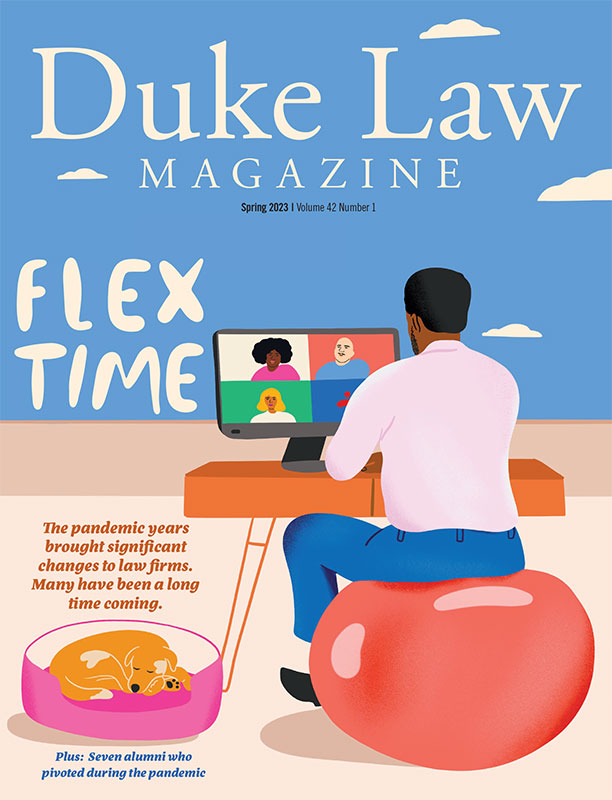
Community Discussion Groups initiative aims to foster dialogue across differences
The Law School’s Diversity, Equity, and Inclusion (DEI) Committee has launched a new initiative designed to open up lines of communication, encourage honest conversations on sensitive topics across the Duke Law community, and foster dialogue across difference.
The Community Discussion Groups initiative launched on Sept. 20 with about 100 students, faculty, and staff participating. The 14 groups have since met monthly for conversations on such topics as building community, belonging, the roots of polarization, humanity in disagreement, and connection across divides. The committee is providing prompts and discussion guides to facilitate the meetings, which will continue throughout the academic year. Katharine T. Bartlett Professor of Law Barak D. Richman, who chairs the DEI Committee, said the initiative aims to strengthen the social fabric of the Law School while enabling all members of the community to feel welcome discussing issues related to their identity.
“I think all of us are still recovering from the pandemic and the isolation that it brought,” Richman said. “We really are a very different community than we were before, just in terms of size and composition, and we want to recover the cohesiveness that we had before. This is a way of building relationships that cut across faculty, staff, and students.”
Richman said the groups were intentionally organized to be as heterogeneous as possible and include a mix of backgrounds, class years, and roles within the community, such as faculty or staff position.
In their discussions, participants have been asked to adhere to eight principles: authenticity, kindness, listening, respect, difference without disagreement/disagreement without argument, making room for all voices, trust and confidentiality, and not identifying subjects of shared stories.
“It’s important to construct these discussion groups with people that you don’t normally have conversations with,” Richman said. “My sense is that there’s a lot of enthusiasm from those who signed up for the opportunity to have periodic conversations with people whom they don’t normally encounter. Saying difference is celebrated in an official sense is different from feeling comfortable expressing your individual identity and comfortable engaging with people with other identities. It’s that degree of comfort that we’re really shooting for.”
Jyren Dillard, a member of the Academic Services staff, said she hopes the small-group setting will enable her to build closer relationships with faculty and students than her job allows.
“I’m always corresponding with professors and other faculty members, but never on a personal level,” Dillard said. “Being connected in a Community Discussion Group has strengthened my knowledge of people’s perspectives and helped me grow more as a person.”
Sahdia Khan ’23 said she values the opportunity to make connections in an authentic way, through the groups’ informal interactions and with the invitation to share personal perspectives on sensitive topics. Growing up in a predominantly white suburb in Kansas, she once thought building community required her to blend in by concealing what made her different. As an adult, she realizes “it doesn’t have to be one or the other.”
“We all yearn for community, but as a minority it can feel like an uphill battle to get there,” she said. “The Community Discussion Groups were a way for me to build ties but also highlight the things about me that make me different.” She said the initiative also promises to have a wider impact. “We have a lot of room for improvement, not just at Duke, but in the legal profession in general. Having these conversations about the importance of having a diverse and equitable and inclusive environment in school will translate when we as students get into the workplace.”

